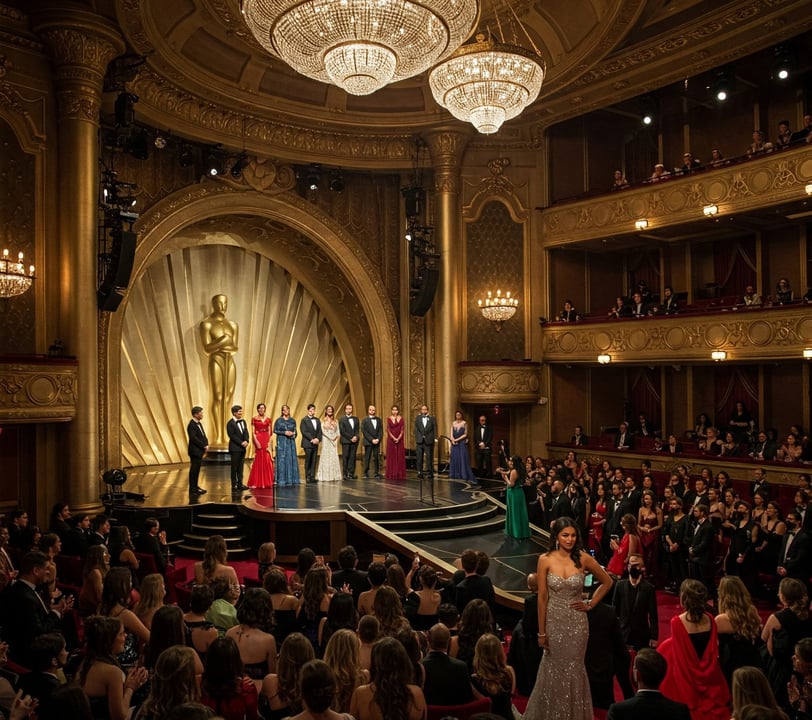The Oscars: An American Perspective
The Academy Awards, commonly known as the Oscars, are one of the most prestigious and anticipated events in the entertainment industry. For Americans, the Oscars represent a mix of glamour, recognition of artistic achievement, and, at times, controversy. Over the decades, the ceremony has evolved, reflecting shifts in culture, politics, and the film industry itself.
3/6/20254 min read


The Prestige and Popularity of the Oscars
For many Americans, the Oscars are more than just an awards show; they are a cultural event. Millions tune in annually to watch the red carpet, the ceremony, and the acceptance speeches. It serves as an opportunity to celebrate outstanding achievements in cinema while also providing a platform for social and political discourse. However, viewership has fluctuated over the years, with recent ceremonies seeing a decline in ratings due to changing viewing habits and criticisms of the Academy.
Criticisms of the Oscars
Despite their prestige, the Oscars have faced significant criticism from both the public and industry professionals:
Lack of Diversity: The Academy has been criticized for underrepresenting women and minorities in major categories. The #OscarsSoWhite movement, which emerged in 2015, highlighted the lack of diversity in nominees and winners.
Snubs and Surprises: Every year, film enthusiasts debate over films, directors, and actors who were overlooked. Notable snubs have included performances by actors such as Leonardo DiCaprio (before his 2016 win) and directors like Christopher Nolan, who went years without winning despite his influential work.
Political Overtones: Many Americans feel that the Oscars have become overly political, with acceptance speeches often touching on controversial topics. While some appreciate this activism, others believe it detracts from the celebration of cinema.
Length and Entertainment Value: The ceremony often runs over three hours, leading to complaints about pacing and unnecessary segments that make the event feel prolonged.
Memorable Moments and Controversies
The Oscars have had their fair share of unforgettable moments, both triumphant and scandalous:
Marlon Brando’s Rejection (1973): When Brando won Best Actor for "The Godfather," he refused the award and sent activist Sacheen Littlefeather in his place to protest Hollywood's portrayal of Native Americans.
The Envelope Mix-Up (2017): One of the most shocking moments in Oscar history occurred when "La La Land" was mistakenly announced as Best Picture instead of the actual winner, "Moonlight."
Will Smith’s Slap (2022): A defining moment in modern Oscar history was when Will Smith slapped Chris Rock on stage after a joke about Jada Pinkett Smith, overshadowing the rest of the ceremony.
Historic Wins: "Parasite" (2019) became the first non-English language film to win Best Picture, marking a milestone for international cinema.
The Most Awarded and Nominated Films
Some films have dominated the Oscars throughout history, earning multiple nominations and wins:
"Titanic" (1997) – 11 wins, including Best Picture and Best Director (James Cameron).
"Ben-Hur" (1959) – 11 wins, setting an early record.
"The Lord of the Rings: The Return of the King" (2003) – 11 wins, sweeping every category it was nominated in.
"La La Land" (2016) – A record 14 nominations, tying with "Titanic" and "All About Eve."
Meryl Streep – The most nominated actress in history, with over 20 nominations and multiple wins.
How Americans View the Oscars Today and the 2025 Ceremony
The Oscars remain an important institution in America, but their relevance is increasingly debated. Some view them as an outdated spectacle disconnected from mainstream audiences, while others still appreciate their role in honoring cinematic artistry. The rise of streaming platforms has also challenged traditional Hollywood structures, leading to more debates about what films deserve recognition. The Academy has made efforts to evolve, such as introducing new diversity requirements and expanding its membership. Whether these changes will restore the Oscars’ cultural dominance remains to be seen.
Ultimately, the Oscars continue to reflect the tastes, controversies, and aspirations of both Hollywood and American society, ensuring they remain a focal point of discussion year after year.
The 97th Academy Awards, held on March 2, 2025, at the Dolby Theatre in Los Angeles, brought significant and historic moments for global cinema. The ceremony was notable for awarding diverse talents and recognizing productions from various parts of the globe.
Key Winners:
Best Picture: "Anora," directed by Sean Baker, was the big winner of the night, taking home five statuettes, including Best Picture, Best Director, Best Actress for Mikey Madison, Best Original Screenplay, and Best Editing.
Best Actress: Mikey Madison was awarded for her performance in "Anora," surpassing favorites like Demi Moore and Fernanda Torres.
Best Actor: Adrien Brody won the award for his role in "The Brutalist."
Best Supporting Actress: Zoe Saldaña received her first statuette for "Emilia Pérez."
Best Supporting Actor: Kieran Culkin was recognized for his performance in "A Real Pain."
Best International Film: Brazil celebrated its first victory in this category with "Ainda Estou Aqui," directed by Walter Salles.
Highlights and Curiosities:
"Emilia Pérez," by Jacques Audiard, led the nominations with 13 nods, but won only two statuettes: Best Supporting Actress and Best Original Song.
The animated film "Flow," from Latvia, directed by Gints Zilbalodis, secured the country's first Oscar in the Best Animated Feature Film category.
The ceremony included a touching tribute by Morgan Freeman to the late Gene Hackman and his wife.
American Perspective on the 2025 Oscars:
For Americans, the 2025 Oscars represented a celebration of diversity and global talent. The victory of "Anora" reaffirmed Hollywood's ability to produce impactful narratives that resonate with audiences and critics. However, the loss of favorite productions and the rise of international films like "Ainda Estou Aqui" reflect a constantly evolving film industry, open to new voices and perspectives.
The presence of filmmakers and actors from different cultural backgrounds and the awarding of films from countries like Brazil and Latvia highlight the growing importance of international cinema in the American view. This diversity enriches the cinematic landscape and offers the public a wider variety of stories and experiences.
In summary, the 2025 Oscars not only celebrated the achievements of American cinema but also recognized and valued the global contribution to the seventh art, reflecting a more inclusive and representative industry.
Explore
Discover diverse topics in one convenient hub.
Connect
Learn
contact@mindstormblog.com
© 2025. All rights reserved.


